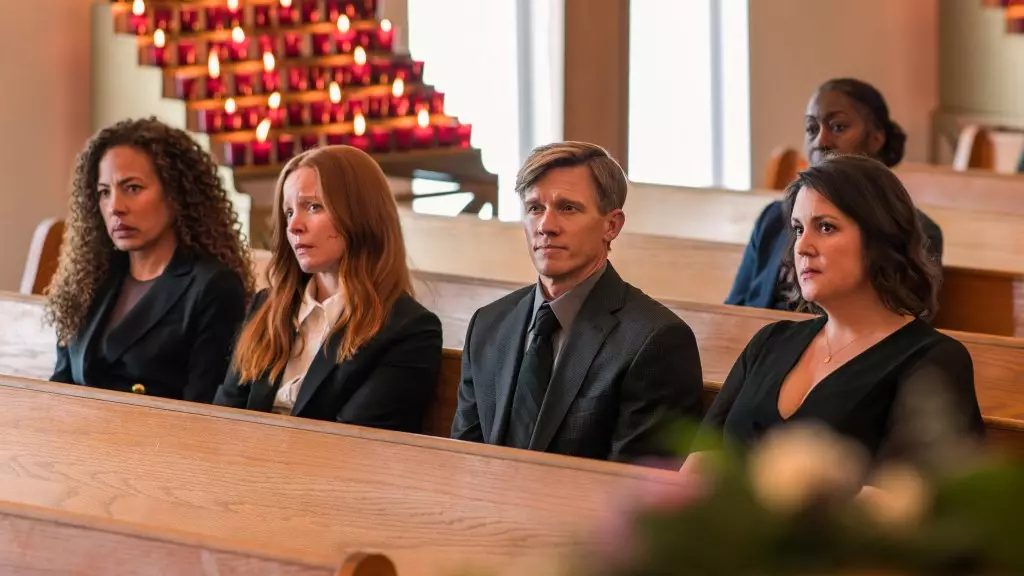The dark, twisted narrative of “Yellowjackets” continuously skews the line between survival and morality, delving deep into the psychological struggles of its characters. In its third season, the show has created a tapestry of interconnected fates that culminated in a shattering moment of loss. The recent death of Adult Van (portrayed with grace by Lauren Ambrose) in the episode titled “How the Story Ends” adds another poignant layer to an already intense storyline. Co-creator Ashley Lyle’s connection to Van illustrates how intertwined personal experiences can color creative expressions, making the loss even more poignant. Lyle, reflecting on her own childhood experiences, reveals that her affection for Van isn’t just professional; it’s deeply personal and rooted in nostalgia.
The Significance of Van’s Character Arc
Van’s character has served as a conduit for themes of authenticity and existential questioning throughout the series. Diagnosed with terminal cancer, her struggle to reconcile her desires with grim reality speaks volumes about human resilience. Lyle’s poignant assertion that “the chickens were always meant to come home to roost” captures the show’s adherence to a narrative that does not allow for escape from the shadows of one’s choices. Through her tragic journey, Van embodies the conflict between selfish desire and collective responsibility, showcasing the price of survival in the wake of trauma.
In her final screenplay moment, Van is faced with an impossible choice—a metaphorical ‘knife’ held to her and her friends’ throats by her former teammate, Melissa (played by Hilary Swank). This confrontation is a culmination of Van’s internal battle, forcing her to confront whether she could ever sacrifice her principles for survival. The raw vulnerability displayed in that moment, alongside Ambrose’s devastating performance, crystallizes Van’s evolution from desperation to self-acceptance.
Artistry in Death: A Beautifully Heartbreaking Moment
The tragedy of Van’s demise is amplified by the emotional weight of her decision to drop the knife. The insight Lyle provides—that it’s not merely about the act of survival but the ethical landscape surrounding it—renders the scene a poignant commentary on human values. The actress’s delivery of the line, “Why can’t I be that?” captures the essence of Van’s despair. It’s an inquiry not just of survival instincts but about moral surrender. The contrasting desire for life, tinged with the unwillingness to become corrupted, gives audiences an authentic grasp of what truly defines us in life-or-death situations. The execution was not merely a narrative decision but a deep philosophical exploration wrapped in raw human experience.
Collective Grief and its Ripple Effect
The narrative establishes a collective grief that resonates deeply with the audience, reminding us that death in storytelling is seldom a solitary experience. The losses in “Yellowjackets” have added weight to the friendships and conflicts that define the relationships amongst the characters. The emotional toll is not just felt by those onscreen but reverberates through the viewer’s own sense of empathy and connection to the characters’ plights. Following the shocking death of Natalie in Season 2, and the subsequent losses this season—including Adult Lottie and Coach Ben—each death creates a cascading effect that further isolates those who are left.
Liv Hewson, who plays Van’s teenage counterpart, has described the filming of this season as intensely emotional. Foreknowledge of Van’s fate has provided added layers to her portrayal—a reminder of how crucial it is for actors to navigate their characters’ journeys with depth and anticipation. This deliberate creation of emotional weight is what makes “Yellowjackets” not just a show about survival, but a profound exploration of what it means to be human in the face of insurmountable odds.
The Essence of Candid Reflection
“Yellowjackets” continues to challenge viewers to ponder difficult ethical dilemmas, and Van’s tragic end becomes a powerful catalyst for broader discussions about agency, sacrifice, and morality. As Lyle expresses her personal grief, the weight of such losses in storytelling collaborates with her own experiences, creating a rich tapestry of authenticity. The ability to intertwine personal emotions with character arcs allows for a wider emotional reach, transforming what could be mere plot points into visceral experiences that stay with us long after the episode ends. Each character’s demise reverberates with the audience, prompting us to reflect on what we would sacrifice, or how much we value our humanity, even in the darkest of circumstances.

Leave a Reply